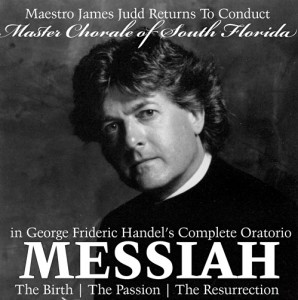
Conductor Judd Passionate About Miami Music Project
He’ll be returning to local stages next week to lead the Master Chorale of South Florida and the Boca Raton Symphonia in complete performances of Handel’s Messiah, but what he’s focused most on these days is reaching 2,000 children in the Miami-Dade school system.
In an interview I had with him earlier this month at home in Fort Lauderdale, James Judd talked at passionate length about the Miami Music Project, which received a $1 million, 3-year grant from the Knight Foundation to bring more classical music education into the schools. It’s something he believes in strongly, seeing it as a life-builder as much as an introduction to a great corpus of music.
“One of the things I’ve always felt … if you’re an opera company, if you’re a symphony orchestra in town, you do your X number of weeks in a school, but for the most part, we try to reach kids once,” Judd said. “If you could reach them once a year, that would be a miracle, but we can’t even do that. So how can we do something on a more regular basis?”
The project got under way when Judd began working with Richard Harris, a former New World Symphony trombonist who was “very, very keen on similar ideas,” Judd said. Harris, who is executive director of the Miami Music Project, led a team of volunteers who surveyed audiences about what they thought was missing in local classical music.
The project came up with a feasibility study, and then received the Knight grant, which the team has to match. But it’s given Judd a way to advance the cause of the arts as well as build future concert audiences.
“I do it as a volunteer, like I am for the Messiah; I think we’ve got to give back something, we’ve got to really do something for the arts,” he said. “I have a great experience going and working with great orchestras all over the world and doing concerts and being well-received, asked back: that’s great. But there’s something missing everywhere, and that is everybody’s searching for the new generation of concertgoers.”
The Miami Music Project has “adopted” 200 children each in 10 county schools, and is sending ensembles of various sizes into those schools, where its musicians interact with the children and explain what the music is all about. Judd said soon the children will be working with the musicians and a special software program to compose their own music.
“Now we might also come to creation from rock music that they might like, as well as classical music, and say: Well, let’s take some rhythmic cells, let’s develop those rhythmic cells,” he said. The ultimate goal is to get some music written that can be played at a year-end festival at the Arsht Center.
“And at that festival where we present the music the kids have created, perhaps we can also put on some Shostakovich or Beethoven for other parts of the community as well as children,” Judd said. “Bring in some philosophers and writers, and discuss on different levels, with different people, the role of music in the world, try and open up some of these issues, and examine a little bit what we’re doing.”
Already the project has found itself helping out in unexpected ways, stepping in to revive the Miami-Dade high school honors orchestra, which was not planning to meet during this school year because of funding cuts. And so earlier this month, Judd led the 82 members of the orchestra, as well as a dozen professionals helping out, in a concert during Family Fest Day at the Arsht.
“It was a full hall, and the kids, the public school orchestra, got a chance to perform. And they did brilliantly,” he said. “And so we can see that there’s a need at many, many different levels.”
The power of music education reminds the conductor, who turned 60 in October, of El Sistema, the state music education program in Venezuela that has given rise perhaps most notably to the career of Gustavo Dudamel, who now leads the Los Angeles Philharmonic.
“It’s about a real social thing, a belief that José Antonio Abreu had 35 years ago that music was a great healer, music could bring people together, that music could actually transform and save lives,” Judd said.
Judd said his principal duty now is to raise money for the project and keep the mission going. He’s been encouraged in this by the reaction to the project’s work so far.
“There’s a thirst, there’s a need, for as many weeks as we can possibly do.” he said. “It’s been incredibly well-received. “
(Judd’s three Messiah performances will feature the Master Chorale of South Florida, the Boca Raton Symphonia, and four young soloists from the Curtis Institute of Music in Philadelphia: Sarah Shafer, J’nai Bridges, Joshua Stewart and Thomas Shivone. The concerts are set for 8 p.m. Friday, Dec. 4, at Trinity Cathedral in Miami; 8 p.m. Saturday, Dec. 5, at Spanish River Church, Boca Raton; and 2:30 p.m. Sunday, Dec. 6, at the Broward Center for the Performing Arts in Fort Lauderdale.)